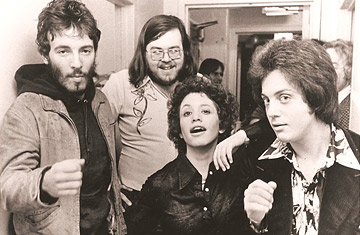
Singer-songwriter Janis Ian, center, poses with Bruce Springsteen, left, and Billy Joel, right.
(2 of 2)
Tell me about writing Seventeen.
It took three months. I started it sitting at my mom's dining-room table. I had to move back in with my mom because I was so broke —
How could you have been broke?
Bad business management and good spending habits. I bought all my friends guitars and I had a good time with my money. But then one day the IRS came knocking. Nobody in my family had ever had money. Everybody had been a day jobber, so it didn't occur to anyone that I might need to set aside money for taxes.
You were saying how Seventeen came to be.
I was sitting at the dining-room table reading the New York Times magazine section, and there was a story about a girl who had been a debutante and had discovered that that wasn't all it was cracked up to be. The first line was, "I learned the truth at 18." I was playing this little samba thing on the guitar, and I thought, Oh, that's a good opening line. It didn't scan, so I changed it to "17."
Was it difficult to perform such a self-revealing song?
Yes. I used to sing it with my eyes closed because I didn't want to see anybody laughing at me.
Once you did learn to manage your money, what was it like to have it pouring in?
With a hit in my business — and I suppose it's true in any business — you're working so hard and things are moving so fast that you don't really stop and think, Wow, look at all this money that's coming in. You think more, Wow, I can finally afford a dedicated sound person. I can finally afford a backdrop. I can finally afford to get out of the station wagon and into a van and into a bus and onto a plane. You don't really have time to enjoy it, which is a pity, because that's when you should enjoy it.
You were afraid professionally to come out as a lesbian. Has the industry changed since then?
Absolutely. I think these last 10 years have seen just a huge shift in the psyche of this country as regards gay people. I think AIDS had a lot to do with it. So many families who really believed they'd "never met one" were suddenly confronted with their sons becoming ill, and friends of sons. I think that brought a lot of it into the open. Certainly groups like ACT UP [and] Larry Kramer brought a lot of it into the open. But I think there also has just been a willingness on the parts of people like myself, people like Melissa Etheridge or Elton [John], to stand up and be counted that has hopefully lent some bravery to people who are not in [the public eye].
Do fans tell you about being gay when you talk with them?
They do. [They say], "And then I went to my mom and said, Look, this is the girl who wrote your favorite songs. So I can't be that big a freak." And that's pretty cool. That's a nice effect to have had, to create a bond through your music. The money when you're having a hit is great, but money can be taken from you. What can't be taken from you is the talent and the effect your work has.
